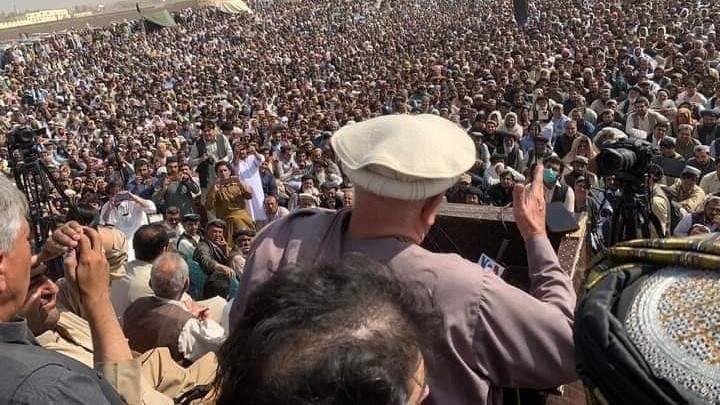
As Pakistan enforces a new visa regime for Afghans willing to cross into Pakistan amid a massive push to forcibly repatriate illegal migrants and Afghan refugees, some politicians have exhorted the government to honour their commitments to allow people from both sides to cross over by simply presenting valid identification documents while warning that their protests could spread.
Addressing a massive sit-in in Chaman on Monday, Pakhtunkhwa Milli Awami Party (PkMAP) Chairman Mahmood Khan Achakzai staunchly advocated that the government should stand by its commitment to the people of Quetta and Qandahar on crossing the border between Pakistan and Afghanistan by simply presenting valid identification documents.
Achakzai added that a promise or decision made by even tehsildar was equivalent to a state-sanctioned undertaking and one that the state must honour. He elaborated that an understanding to this effect had been reached during a meeting between a high-level delegation from Pakistan, led by the then foreign minister Shah Mahmood Qureshi, and authorities in Kabul.
The agreement, Achakzai claimed, would allow residents on the Pakistani side of the Durand Line, spanning from Quetta to Chaman, and corresponding areas in greater Qandahar on Afghanistan's side, to cross the border with Pakistanis presenting their Computerized National Identity Cards (CNIC) and Afghanis their 'Taskerra'.
However, he contended that this facility should have been extended to residents of other areas along the Durand Line as well.
Providing a historical context for this arrangement, Achakzai pointed out that from the time this region was under British rule and up until recently, locals on both sides of the border formally enjoyed the right to cross over freely. This right had been created because an arbitrary demarcation of border by the colonial rulers had split families, with some having residential quarters on one side and public-facing hujras or compounds on the other. Others would have their homes on one side of the border and their lands on the other.
With some tribal lands still straddling both Afghanistan and Pakistan, Achakzai deemed any imposition of a passport and visa regime impractical.
To resounding applause, Achakzai declared that the Chaman protest would not only persist but would also expand to other parts of Pakistan until their demands are met.
On the topic of cross-border trade, he questioned a dual regime implemented by Pakistan with the trade of some items allowed through green channels at airports but prohibited across crossing points along the Durand Line, particularly at Chaman.
He reiterated his demand for the government to set up customs clearing houses at all major crossing points between Pakistan and Afghanistan where they can check and clear goods moving between the two countries. After clearance, he said the goods are checked every few kilometres by a myriad of security agencies just to create hindrances.
The PkMAP chief urged participants of the protest to pursue their cause through peaceful, political means, as he discouraged them from making any derogatory remarks targeting specific ethnicities or communities.
Achakzai stressed the importance of inter-religious and ethnic harmony, noting that this value was ingrained in Pakhtun norms and traditions.
Shifting the focus to Afghan refugees, Achakzai emphasised that they should be treated no differently than refugees in other parts of the world, advocating for equal and non-discriminatory treatment.

